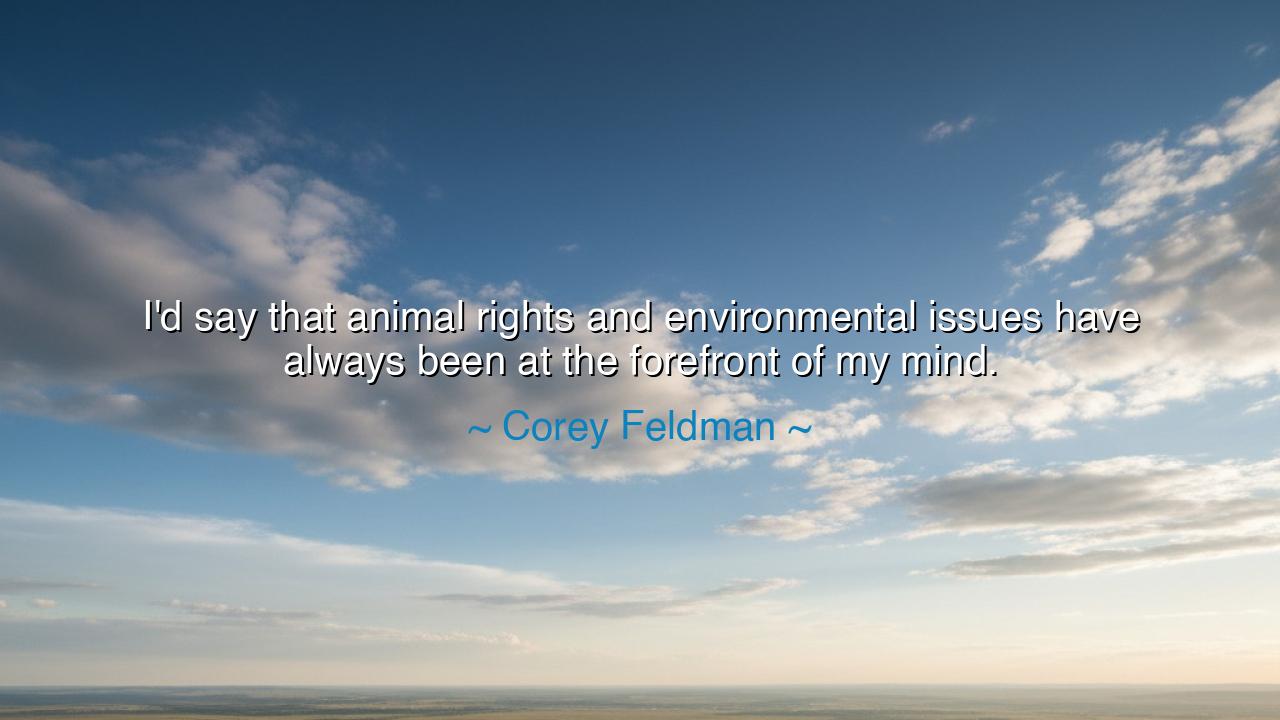
I'd say that animal rights and environmental issues have always
I'd say that animal rights and environmental issues have always been at the forefront of my mind.






The words of Corey Feldman—“I'd say that animal rights and environmental issues have always been at the forefront of my mind.”—are spoken with the tone of quiet conviction, the kind that springs not from passing concern but from a lifelong awareness of the interdependence of all living things. Behind this simple statement lies an ancient truth: that humanity’s greatness is not measured by its power over other creatures, but by its compassion toward them. Feldman’s reflection, though uttered in a modern world of noise and distraction, carries the echo of old wisdom—that the earth and its beings are sacred companions, not possessions, and that to protect them is to protect the very essence of our own spirit.
The origin of this quote can be traced to Feldman’s public advocacy for animal welfare and environmental stewardship, causes that he has supported throughout his career as an artist and humanitarian. Having grown up in the heart of modern civilization—surrounded by fame, artifice, and industry—he witnessed firsthand how often beauty is sacrificed to convenience, and life to profit. His words are therefore not the abstract musings of a philosopher, but the heartfelt confession of one who has seen the imbalance between humanity and nature and has chosen to speak for those who cannot. In declaring that such concerns have always been “at the forefront” of his mind, he affirms that compassion is not an act of charity but a principle of being, a guiding star in a world that has lost its moral compass.
From the dawn of time, the wise have known that the fate of humanity is bound to that of the animals and the earth. The ancient Egyptians revered the cat as a symbol of protection; the Buddhists spoke of ahimsa, the sacred principle of nonviolence toward all living beings; and in the Native American traditions, the earth was called “Mother,” and every creature, from the smallest ant to the soaring eagle, was honored as kin. Feldman’s words, though born in the modern age, draw unconsciously upon this lineage of reverence. He reminds us that love for the earth and its creatures is not a new virtue—it is an ancient duty rediscovered in every generation by those who still have ears to hear nature’s cry.
History, too, has shown us what happens when this duty is forgotten. In the 19th century, the forests of North America were felled without mercy, the bison herds nearly driven to extinction, and the rivers poisoned by the greed of unchecked industry. Yet out of that devastation rose voices of conscience—men and women like John Muir and Rachel Carson, who saw the sacredness of the living world and sounded the alarm. Their courage rekindled the flame of awareness, reminding humanity that the land is not ours to conquer but ours to care for. In the same spirit, Feldman’s declaration stands as a continuation of their legacy—a reaffirmation that to fight for the environment and the creatures that dwell within it is not a matter of sentiment, but of survival and morality.
When he speaks of animal rights, Feldman touches upon one of the deepest moral frontiers of our age: the recognition that animals, too, feel pain, joy, and fear, and that our treatment of them reflects our humanity. The philosopher Albert Schweitzer once said, “Until he extends the circle of his compassion to all living things, man will not himself find peace.” Feldman’s awareness mirrors that same truth: that cruelty, whether toward an animal, a forest, or the air we breathe, diminishes the human soul. To defend life in all its forms is to elevate our own.
But there is another layer to Feldman’s words—one that speaks not only of compassion, but of responsibility. He does not speak as one standing above the earth, but as one standing within it, acknowledging his part in both the harm and the healing. The phrase “at the forefront of my mind” implies mindfulness, the daily, conscious act of living in awareness. It calls each of us to carry the same flame of thought, to live in such a way that the rights of animals and the health of the planet are not occasional causes, but guiding principles of our existence. For what we hold at the forefront of our minds shapes the destiny of the world itself.
Thus, the lesson of this quote is clear and eternal: to love the earth and its creatures is to remember who we are. Humanity is not the master of creation but its caretaker, not the owner of life but its guardian. Let each of us, then, awaken to the truth that compassion is not weakness, but strength; that protecting the vulnerable is not optional, but sacred. In our homes, let us consume consciously. In our choices, let us honor life. And in our hearts, let us keep at the forefront the awareness that every breath we take is shared with the forests, the oceans, and the living beings who walk beside us.
For in the end, as Corey Feldman reminds us, to care for the world is not a cause—it is our calling. When we protect the innocent, we protect the divine spark within ourselves. When we heal the earth, we heal the soul of humanity. And only when we act from this awareness will we find the harmony that the ancients knew—that we and the world are one, and that to serve life in all its forms is the highest expression of what it means to be truly human.






AAdministratorAdministrator
Welcome, honored guests. Please leave a comment, we will respond soon